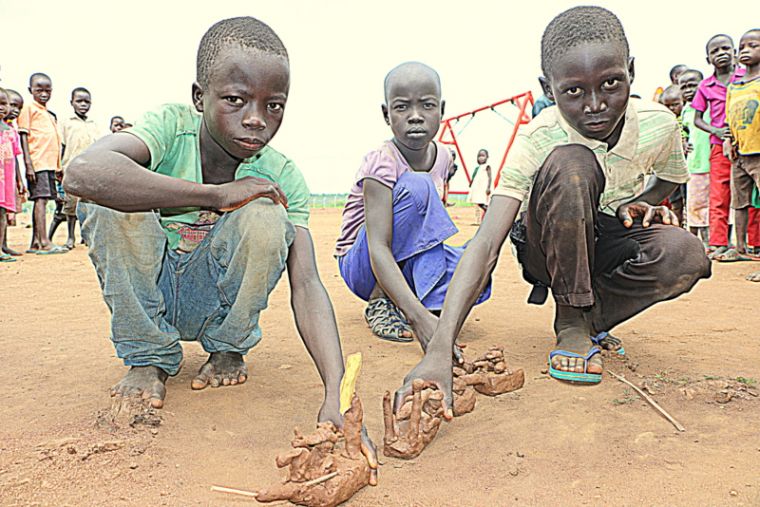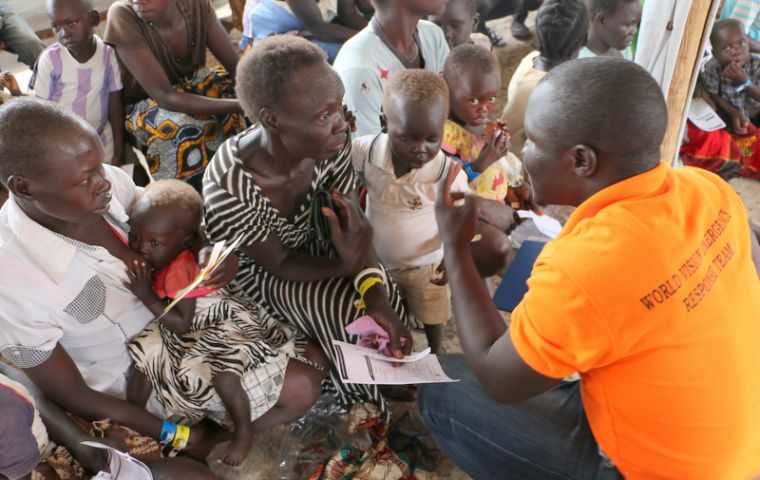South Sudan's child refugees in mental health crisis: 150,000 need therapy for post-conflict trauma
More than 150,000 child refugees in northern Uganda require mental health therapy after fleeing intense violence in South Sudan.
Nearly all South Sudanese children arriving at Uganda's Imvepi and Bidi Bidi refugee settlements require 'psychological first aid', the international children's charity World Vision has warned. As many as 60 per cent require specialist therapy to combat the effects of the stress disorders caused by conflict.

'The majority of children arriving at the Imvepi and Bidi Bidi refugee settlements have faced horrendous experiences. Most have witnessed killings and brutal violence. Some saw their parents murdered in front of them,' said Brenda Madrara, a World Vision child protection facilitator working in the Bidi Bidi camp.
'Every child here has psychosocial needs and it can take a very, very long time for them to recover. If South Sudan's children are not given the therapeutic interventions they need, it will affect generations to come.'
Almost one million refugees have now fled South Sudan for Uganda, 62 per cent of which are children. Reports suggest about 100 new child arrivals at the north Uganda settlements every day, with many experiencing insomnia, regressive behaviour, social withdrawal and violent or self-destructive outbursts.
'Most of the children suffer nightmares, inability to sleep, and are withdrawn. Some have hallucinations – believing that people who attacked them in South Sudan have found them in Uganda,' said Dorothy Namara, a clinical psychologist at the Transcultural Psychosocial Organisation, who have been working with World Vision to support traumatised children.
She added: 'Trauma is like a wound – a silent wound. When a silent wound is not treated, it keeps eating slowly. When trauma is not treated in early childhood, then it manifests in adulthood.'
Groups seeking to alleviate the psychological crisis in Uganda say that the demand currently outweighs the available resources, with most aid being channelled to other relief efforts.
'We need to tackle the extreme levels of conflict-caused trauma now', Namara said. 'If this trauma is normalised, it can devastate children's lives for generations to come as well as create a cycle of violence and underdevelopment in the region. The future of South Sudan is dependent on the mental health of these children.'

In response to the crisis World Vision UK is today launching the #BearsOnStairs campaign to raise awareness of the brutal psychological cost of war of South Sudan's children. The campaign will culminate with 700 teddy bears being placed on the steps of London's St Paul's Cathedral on 27 July, representing the number of children arriving in Uganda every week.
World Vision UK's CEO Tim Pilkington urged action from the international community on behalf of child refugees. He said: 'The horrendous crisis faced by South Sudan's refugees poses an urgent need for mental health relief. Children who have survived years of war don't only have physical scars. They may carry mental scars from the conflict for the rest of their lives.
'The Ugandan government and NGO partners on the ground are overwhelmed by this refugee crisis. Tens of thousands of distressed children are not getting the support they need to recover from the horrors of the South Sudan conflict. We've only scratched the surface of the mental health problems the war is leaving in its wake.'
You can read more about rhe #BearsOnStairs campaign and the work of World Vision here.











